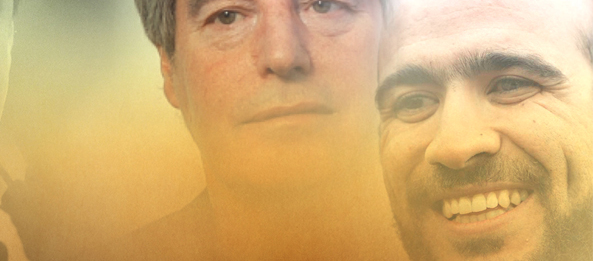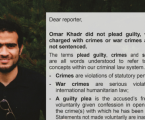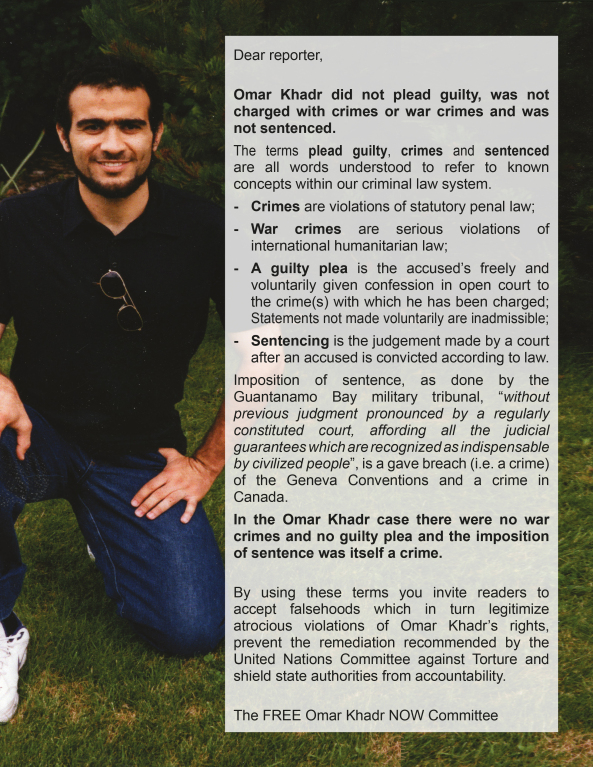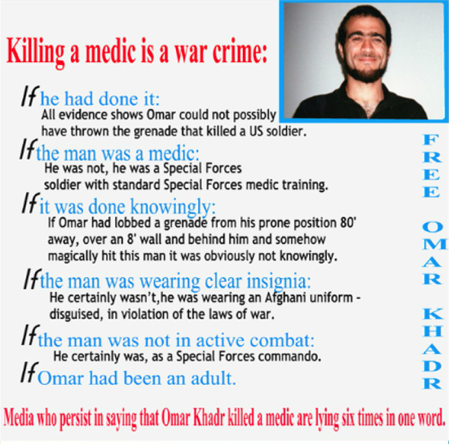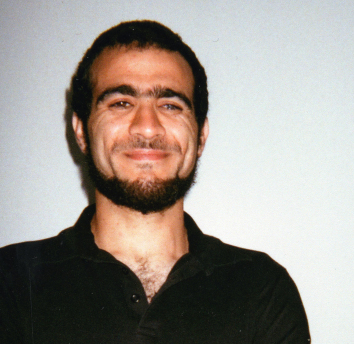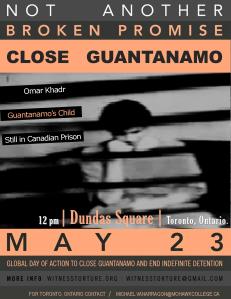Print Article [+]
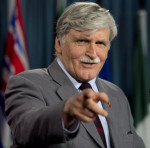 On the occasion of Senator Roméo Dallaire’s announcement that he is leaving the Senate, the Free Omar Khadr Now Campaign would like to thank him for his unwavering support for Omar Khadr and his strong moral convictions in speaking up for the rule of law and human decency.
On the occasion of Senator Roméo Dallaire’s announcement that he is leaving the Senate, the Free Omar Khadr Now Campaign would like to thank him for his unwavering support for Omar Khadr and his strong moral convictions in speaking up for the rule of law and human decency.
Not many in our government have had the courage to speak on behalf of Omar Khadr who continues to be unlawfully imprisoned.
Thank you Romeo Dallaire, you are a true hero in every sense.
Roméo Dallaire spoke out in the Senate (June 29, 2020) about the abuse and mistreatment of Omar. He said the following:
Honourable senators, I am rising now to put on the record the case of the only child soldier prosecuted for war crimes.
Canada has been the world leader in drafting and promoting the Convention on the Rights of the Child and the Optional Protocol to the Convention on the Rights of the Child on the involvement of children in armed conflict, specifically addressing child soldiers. This convention entered into force in 2002 and has been signed by 130 countries.
That same year, Canada again led the charge in developing that optional protocol, and now 150 countries have signed to it. This protocol prohibits the use and recruitment of children under the age of 18 in armed conflict. The Optional Protocol led to the drafting of the Paris Principles, which clearly established the definition of a child soldier. I have read this definition in the chamber previously, but I wish to do so again simply to remind us:
Any person under 18 years of age who is compulsorily, forcibly or voluntarily recruited —
Of course, in conflict zones, the term “voluntary” is questionable.
— or used in hostilities by any kind of armed forces or groups in any capacity, including, but not limited to, soldiers, cooks, porters, messengers, sex slaves, bush wives and those accompanying such groups. It includes girls recruited for sexual purposes and forced marriage. It does not, therefore, refer exclusively to a child who is carrying or has carried arms.
Imagine, honourable senators, that you are a 13-year-old boy. For your whole life your family has moved around, never settling for very long. You live in a culture where your father is never questioned. If he says “Jump,” you ask “How high?” No matter what he asks you to do, you comply. You are barely an adolescent; you cannot fully grasp the meaning or consequences of your tasks. You live in a country where armed conflict surrounds you. Listening to your father is, in fact, your survival.
Your father sends you to live and work with his associates. He tells you to stay there and to listen to what you are told. As you are working one day, the compound you are in comes under attack by U.S. Special Forces. In the firefight frenzy, you are shot three times. Then you are wrenched from the rubble and accused of killing an American soldier. It is 2002, you are 15 years old, and your name is Omar Khadr.
To produce a professional soldier, the minimum standard in NATO is about one year. That is a basic infantryman. To produce a Special Forces soldier, the minimum time and experience is four years of service, plus up to another year to year and a half of special training.
This compound was first, as we say, softened up by air attacks, bombed by 500-kilogram bombs from the air, and then assaulted by a full-fledged Delta Special Force, which Omar Khadr finds himself in the middle of.
Today, honourable senators, I speak about the case of Omar Khadr, a Canadian citizen and former child soldier currently held in prison at Guantanamo Bay. It is my intention to speak about the nightmares this now man has suffered, the failures of our government to protect him, and the immediate necessity for this government to sign the transfer agreement and bring Omar back home.
It is believed that during the firefight, Omar Khadr threw a grenade, killing Sergeant Christopher Speer, a Delta Force strategic forces soldier and special forces medic. He was sent to the Americans’ notorious Bagram prison. Once identified, the Canadian government sought and was denied consular access.
In September 2002, Foreign Affairs sent a diplomatic note to the U.S. Department of State. The note made three points.
- First, there was “ambiguity as to the role Mr. Khadr may have played” in the battle of July 27, 2002.
- Second, Guantanamo Bay “would not be an appropriate place for Mr. Omar Khadr to be detained,” since “under various laws of Canada and the United States,” his age provided “for special treatment of such persons with respect to legal or judicial processes.”
- Finally, the diplomatic note went on to ask for “discussions between appropriate officials on Mr. Khadr prior to any decisions being taken with respect to his future status and detention.”
In spite of our government’s concerns, Omar was transferred to Guantanamo Bay, where he has remained a prisoner for the last 10 years. Despite the best efforts of the truth, what has followed in the last 10 years has been a nightmare for this ex-child soldier, a stain upon our society, and a fundamental reproach upon our respect for international law and conventions that we have signed.
We have since learned that after being hospitalized at Bagram, this seriously injured 15-year-old was pulled off his stretcher onto the floor and his head was covered with a bag while dogs barked in his face. Cold water was thrown on him; he was forced to stand for hours with his hands tied above his head and to carry heavy buckets of water to aggravate his wounds. He was threatened with rape, and bright lights were shone on his injured eyes. In fact, he has lost one eye.
We have learned that, while prepping him for American and Canadian interrogators at Guantanamo Bay, this boy was subjected to further tortures, such as extreme sleep deprivation and endless hours of standing up, designed to exhaust him. After being held without charge for three years, Omar is charged by the U.S. as an “enemy combatant” in November 2005 and put to trial through the Military Commissions Act.
During the 10 years that this nightmare has gone on, we have realized that the most serious violations of Khadr’s rights have been covered up—violations of the right to due process, the right to protection from torture, the right to protection from arbitrary imprisonment, the right to protection from retroactive prosecution, the right to a fair trial, the right to confidential legal representation at the appropriate time and place, the right to be tried by an independent and impartial tribunal, the right to habeas corpus, the right to equality before the law and the rights stemming from the Convention on the Rights of the Child.
The status of child means that the person concerned is unable to understand the world into which he was thrown. The need to protect and take care of children has always been the code of humanity. The use of child soldiers is a violation of that code. The status of child soldier means that the person concerned is subject to the most atrocious form of indoctrination, to physical and psychological torture and to the most poignant mental poverty into which an innocent child can be thrust.
For too long, we have done nothing. We must remember that the substance of the Khadr case involves children’s rights. In this type of case, we must demonstrate wisdom, compassion and a true willingness to take into account the overall context and remember that all children have inalienable rights, even if they or their families have done things of which we disapprove. These rights are meaningless if we respect them only selectively.
When the military commission in Guantanamo dismissed the charges on a technicality in June 2007, the Government of Canada could have exerted pressure to have Omar repatriated, particularly given the Kafkaesque possibility that the United States government would, as it had promised, appeal the decision before a tribunal that had yet to be set up.
I went to Washington to talk to members of Congress, the Senate and the State Department. They said that the only entity refusing to go ahead with Omar’s departure was the Pentagon, backed by the Canadian government’s lack of action.
From the outset, the U.S. administration adopted rules as the need arose whereas Canada’s representatives shirked their responsibilities towards a citizen. The charges of murder, attempted murder, conspiracy, material support for terrorism and espionage under the Military Commission Act are reiterated in the appeal.
While Omar was waiting for his trial to begin in Guantanamo Bay, the Canadian courts studied his case. In May 2008, the Supreme Court of Canada ruled that Canada’s representatives had violated Omar Khadr’s rights, which were guaranteed by the Canadian Charter of Rights and Freedoms, when he was illegally interrogated in 2003.
The court ordered that the fruits of the interrogations sent to the American authorities be disclosed to Omar. Canada complied with the order to disclose the information, but it has done nothing to put an end to this nightmare.
In January 2010, once again, the Supreme Court of Canada concluded that the Government of Canada had continued to infringe Omar’s rights under the Canadian Charter of Rights and Freedoms, finding that the treatment Omar was subjected to offended the most basic Canadian standards. The court stopped short of ordering the government to repatriate Omar, because of the Crown’s prerogative over foreign affairs.
Therefore, the situation is focused specifically on the Crown.
The government sent a diplomatic note to the United States to ask the Americans not to use the fruits of the Canadian interrogation. This was nothing but a symbolic gesture that did nothing to compensate for the serious, fundamental violation of Omar’s rights by Canadian agents.
In August 2010, Omar Khadr’s trial started in Guantanamo Bay, even though he was a child soldier. He decided to plead guilty because he wanted a chance to live. Ultimately, he is the one who took responsibility.
Canada was intimately involved in the pre-trial plea deals and negotiations. In October 2010, Canada committed to return Omar to complete his sentence in Canada after he served one additional year in Guantánamo Bay.
On November 1, 2010, in the House of Commons, then Minister of Foreign Affairs Lawrence Cannon said that Canada will implement this deal; yet, eight months later, he was eligible to return to Canada and we have seen nothing from the government. Why the delay?
This government has turned what should have been a technical, bureaucratic decision into a political game, a political football. The Americans have held up their end of the deal. Omar Khadr has held up his end of the deal. The Americans have signed his release, dated April 16, so that the Canadian government can take him and incarcerate him in appropriate establishments in this country in order that he can receive, as other prisoners do, rehabilitation and reintegration into our society. Why is the Canadian government refusing to follow through on its word? If this is a political decision, what is the political impediment for bringing him here?
The U.S. government is not known for being soft on terrorism. The U.S. would never agree to transfer a detainee, especially to an ally, if they believed that that detainee was in any way a threat.
He will not be walking the streets; he will be going to a Canadian prison. Despite this, our government continues to stonewall the United States’ efforts to return Omar Khadr to Canada. In fact, the Canadian specialist or technocrat in Washington refused to meet with the Americans to even start discussing the details of how to bring him back, under what means and under whose control.
The Minister of Public Safety tells us that the matter is under consideration. That is not a particularly good response. Perhaps, as Mr. Khadr’s Canadian lawyers have said, the minister thinks that it has not been that long, but the minister has not been in Guantánamo Bay for a decade under less than appropriate conditions, even compared to our jails. The minister does not sit shackled to a floor waiting for the decision to return him to Canada. Khadr does.
There is a great deal of frustration in the American government towards Canada. Not only is the patience of our closest ally wearing thin, but the world has been watching Canada’s missteps in this case. Just this month, the UN Committee against Torture in its report urged Canada to promptly approve Omar Khadr’s transfer application. Canada’s reputation as a defender of human rights continues to be sullied the longer this process and his detention in Guantánamo Bay continue. It is a simple fact of fulfilling a promise; you either sign the deal and you implement it, or you go against the deal and lose your credibility as being a fair negotiator with your closest ally.
As Omar Khadr’s defence lawyer put it last week in a press conference:
The United States and Canada are supposed to be the good guys. We’re supposed to be the people that the other places in the world who are looking for freedom look at for how things are supposed to be done the right way. We’re supposed to stand for human rights, dignity and the rule of law. The cornerstone of the foundation on which the rule of law is built is honouring your agreements.
Canada must honour the agreement it has with Omar Khadr and return him immediately to Canada. There are all kinds of planes waiting to bring him back. There is a whole program already in place through the university in Edmonton where he has already commenced his rehabilitation while incarcerated in Guantánamo Bay.
There can be no doubt, and I conclude, that the case of Omar Khadr taints this government, this country and all of its citizens. Our credibility in attempting to extricate, demobilize, rehabilitate and reintegrate child soldiers, as I recently was doing in the Congo and South Sudan, is affected by the fact that we are not playing by the rules that we have instituted and want other people to play by. They are not stupid. They know we are not playing by the rules. It was put into my face that the Khadr case is an example where we sign the papers, we even make deals with our allies, but we do not have the guts to implement them.
.
Like this:
Like Loading...

